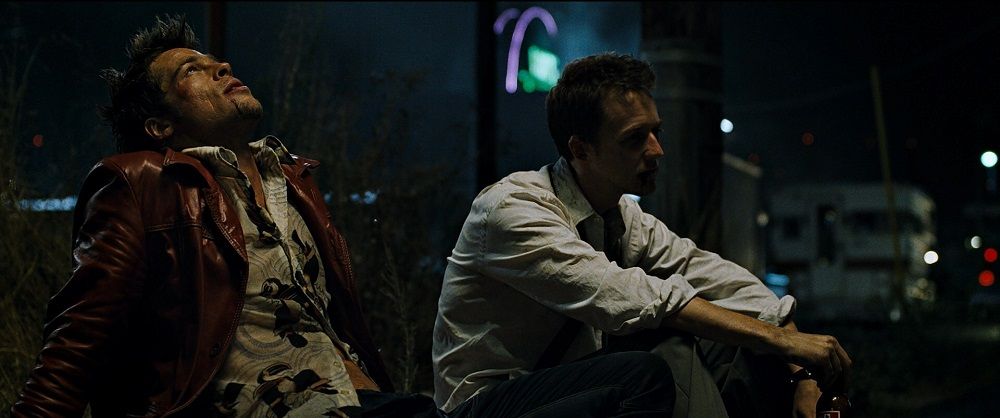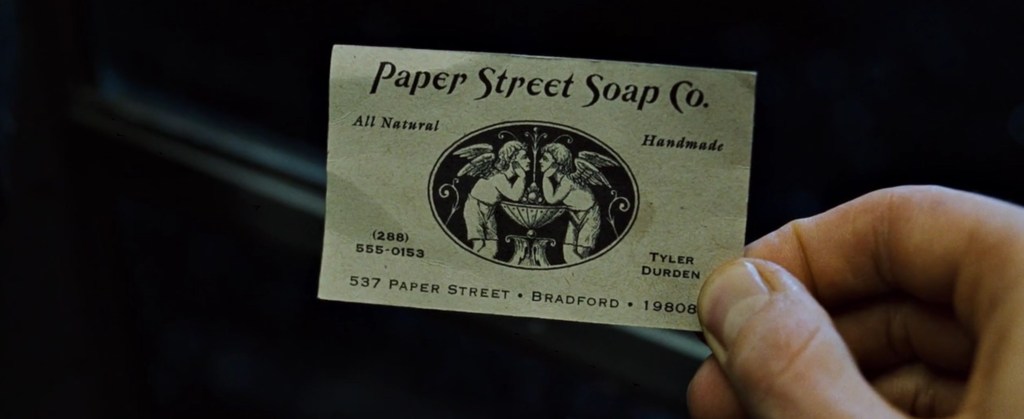As Americans, in a country where advertising expenditures surpass hundreds of billion dollars a year, most of us are puppets in the play of consumerism. Consumerism is defined as a preoccupation with and an inclination toward the buying of consumer goods. Fight Club (1999), based on a book written by Chuck Palahniuk and starring Brad Pitt as Tyler Durden and Ed Norton as the Narrator, is a glorified movie known mostly for its theme of reasserting masculinity in an emasculated society. However, the philosophical interpretation of Fight Club has nothing to do with this. To most of its fans’ negligence, Fight Club is a film that explores both ends of the “consumerism spectrum,” and reveals that following anything blindly can lead to a loss of control and identity.
The film follows the anonymous main protagonist, The Narrator, as he meets a man named Tyler Durden who introduces him to anti-consumerism. The Narrator is a nerdy, jumpy 30-year old man who suffers from insomnia and only finds comfort in buying excessive amounts of Ikea furniture and attending support groups for issues he doesn’t have, posing as a victim. Attending these groups is the only thing that allows this inexpressive character to feel emotion. We can see how pitiable his life is in a scene where he is in a support group for testicular cancer and is sobbing between the “man tits” of a cancer victim named Bob.
Soon, we are introduced to a charismatic and chic man named Tyler Durden, a traveling soap salesman who rocks an expensive-looking red leather jacket and shades that cover half his face. When Tyler and The Narrator’s paths cross again, due to The Narrator’s house burning down, Tyler introduces him to the idea of Fight Club, a secret underground club where men can come to fight off their stress and reconnect with their inner manliness.
More men join this club, which is quite ironic in that the first two rules of Fight Club exist to maintain its secrecy. Because of this flaw in the club’s politics, it grows massively, and this is where Tyler is able to take advantage of these brotherly bonds that have been created to foster a terrorist anti-consumerist gang called “Project Mayhem.” Tyler is a charmer, and with his eloquent speech and booming confidence, he is able to seduce the members of Fight Club to agree with him. He goes on rants about how advertising and large multi-national corporations are just demons who trick us to believe that we are what we own: “Man, I see in Fight Club the strongest and smartest men who’ve ever lived. I see all this potential, and I see squandering. Goddammit, an entire generation pumping gas, waiting tables—slaves with white collars. Advertising has us chasing cars and clothes, working jobs we hate so we can buy shit we don’t need.”

Tyler brands the members of Project Mayhem with an acid mark on their hand, spurting out thunderous sentences about how through pain, you can dispose of distractions to become your true self. He reveals that the soap he makes is made from human fat he steals from liposuction clinics. At this point, he is the boss, the kingpin, the master to the slaves of his project. These men abide by him blindly, mutating their obsession with consumer goods to an obsession with receiving Tyler’s praise and terrorizing these corporations.
The Narrator watches all of this, mainly in the background, confused as to when this terroristic approach to society began. He decides to confront this escalation to terror, only to find out that Tyler Durden is a figment of his imagination. He is Tyler and in his insomniac state of materialism, transgressed through his obsessions and formed a juxtaposition of his beliefs in his mind.
Tyler Durden, as an imagined idea, was an irony. He preached that consumerism led to buyers believing that what they owned is what defined them, but he also created a denomination of dogmatic followers who worshipped this idea of anti-consumerism. These followers went from being consumers of materialism to consumers of this idea that Durden taught them. Both of these philosophical ideologies led the Narrator to lose control of his identity, and that is what this movie is arguing: the only objects in this world that can own you are your thoughts, not any corporation’s products and not anybody else’s idea. Neither of these determine our worth and therefore, we should not perceive them to be glorified or holy.
This film is shot perfectly by a man who is expert at visual storytelling. David Fincher also directed Se7en, The Game, and Panic Room. Fincher is able to paint a story vividly, oftentimes including many uniquely extreme closeups in his movies. One example is of when Tyler Durden poured acid on the Narrator’s hand and his skin was burning. These closeups allow the audience to feel as if they are immersed in the movie. Fincher is also known for using very dark lighting, with a color overlay—blue in Fight Club’s case. This darkness can make the plot seem more twisted and mysterious. Fincher is also known for his fluid techniques. He uses special equipment and effects to pan over from one place to another to establish a scene. All of these stylistic approaches to filming allow him to create a very unique look that can be distinguished even if you only look at only one frame.

Fincher’s storytelling allows the movie to transcend most movies in that it challenges your subconscious ideologies. He is able to create this anarchistic character who lures you into believing that anti-consumerism is the moral way of living. This nihilistic approach to society, while looks depressing written on paper, is alluring when represented in Durden’s character. As we watch Tyler speak passionately about how societal norms have degraded us to servants of corporations that feed off of our materialistic desperation, it is easy to agree with him. This idea of rejecting modern convictions and return to our basic needs is attractive. However, in the end of the movie, when The Narrator is able to destroy this side of him, that is the moment when we are allowed to reevaluate Durden’s beliefs and make our own conclusions about consumerism.
This movie is a classic in that it is excellent at making you think deeply about what you consider to be normal and what you consider to be extreme. I recommend this movie to anybody who wants to be awed as their brain takes a trip to David Fincher’s world of drama.
-Tasneem Ahmed

gpare
September 21, 2016 — 11:01 pm
I really love your analysis of the director’s choices, and the really clear and complete way you’ve summarized the plot. Your review has really made me want to see this movie. Its sounds super trippy — I’ve heard about Fight Club before but I never knew it dealt with such deep issues. I’ll be sure to look out for that blue color overlay and the use of dark lighting. The only thing I would suggest would be maybe to use more time in the review on analysis and less on the summary of the movie, as awesome as that was.